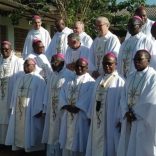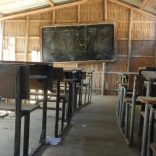Mozambique: New tech boosts Criminal Investigation Service’s anti-drug trafficking operations
Mozambique: Compulsory schooling extended to 9th grade

DW (File photo)
The ‘Education for All’ movement has applauded the Mozambican Ministry of Education’s move to keep children in school beyond the current Grade 7 benchmark.
Compulsory basic education in Mozambique will be extended from the 7th to the 9th grade. The Ministry of Education says the goal is to keep children in school longer so they can assimilate more knowledge and harmonise the country’s educational policy with international practices.
DW Africa spoke with Sarmento Preço, from the Education for All Movement (MEPT), a platform that brings together several non-governmental organisations working in the area of education in Mozambique.
Preço says the extension of basic education is the “ideal solution” given the country’s current economic context.

DW Africa: Is this enough to keep children in school?
Sarmento Preço (SP): I think it’s the ideal solution for now, because what happened was that our primary education, which was, in this case, the basics, ended in the 7th Grade. Looking at the entry level, the child who enters school at age six will complete six classes by age 12. He is still a small child, who can hardly go on to vocational education. If the child attends first cycle secondary education, that is, 7th, 8th and 9th Grades, from there he or she can go on to vocational education. It is true that our country does not yet have secondary education in all areas and regions, but this is an issue that has to be discussed.
DW Africa: Another reason the Ministry of Education opted for this model is to harmonise with international practices. However, the realities are completely different. Is this harmonisation argument valid?
SP: At the international level, what I know in a few countries is that the 10th grade, which is the secondary education of the first cycle, has been the basic level. That is why we opted for the 10th class, not in primary education, but in secondary education in the first cycle. It is true that in some countries basic education is the 12th class, but looking at the economic situation of the country – because also to feed the basic education of 7th to 9th grade secondary education will not be easy – it would be difficult to implement basic education up to the 12th class.

DW Africa: Another worrying problem in Mozambique is the poor quality of education, which also suggests poor teacher training. How do you think this problem should be solved?
SP: We have quality problems. Studies done in 2013 showed that only six percent of children could read and write, and the studies in 2016 lowered even this average to something around four percent. But I do not attribute this solely to the quality of teacher training. There are many situations that can influence this. We are talking about classes with an average of 70 to 80 students, for example. The teacher can hardly manage this. We are also talking about the infrastructure, which is another problem. The low quality of education is not limited to the quality of teacher training, but is wrapped up in the situation of one’s own country: poverty, overcrowded classes. We have children studying on the ground, we have others who even do not have classrooms.
DW Africa: MPs have demanded that pre-school education be compulsory, but the government has rejected this proposal, saying costs would be high. Is pre-primary education fundamental?
SP: Pre-primary education is very fundamental. Children, before entering school, should go through this teaching. We have good examples of this, that children who go through kindergartens, ‘escolinhas’, get better results in Grade 1. But in truth, and according to what we are seeing, the reality is that even kindergartens, where children study before ‘normal’ schooling, are a little onerous.
School curricula must respect national values – Minister













Leave a Reply
Be the First to Comment!
You must be logged in to post a comment.
You must be logged in to post a comment.